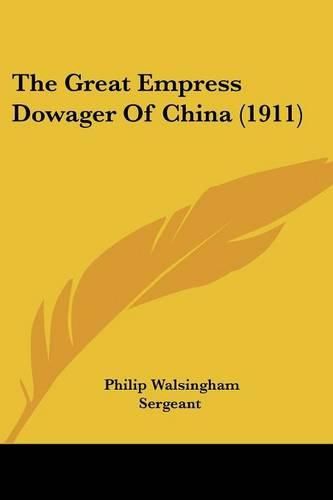Readings Newsletter
Become a Readings Member to make your shopping experience even easier.
Sign in or sign up for free!
You’re not far away from qualifying for FREE standard shipping within Australia
You’ve qualified for FREE standard shipping within Australia
The cart is loading…






Purchase of this book includes free trial access to www.million-books.com where you can read more than a million books for free. This is an OCR edition with typos. Excerpt from book: CHAPTER III THE REIGN OF HIENFUNG ‘ I 'HE life of the unlucky, well-meaning Emperor Taokwang closed in the second month of 1850, trouble pursuing him to the end. A big Mohammedan revolt in Kashgaria, the second of the kind during his rule, broke out in 1846, and was only suppressed after merciless severity on the part of the Chinese generals. Seditious movements of two great secret societies, the
Triads in the South and the
White Lilies
in the North, followed, and paved the way for the gigantic Taiping rebellion in the next reign. The successor of Taokwang was his son Yichu, through marriage with whom a few years later Yehonala was enabled to play her part in the world. Yichu was the fourth of nine sons, of whom the three eldest had all died before their father. Succeeding to the throne at the age of nineteen, he took, in accordance with the Chinese Imperial custom, a reign-name, by which he is known to history. Just as his father, originally Prince Mienning, called himself Taokwang, Glory of the Reason, so Yichu assumed the style of Hienfung, Complete Abundance. A weak but obstinate youth, with a greatinclination toward the pursuit of pleasure, he began very early to show his character by dismissing from office the advisers in whom his father had put most trust, and replacing them by favourites of his own, the chief among whom were his nephew Tsaiyuan, Prince of I; Prince Ching, a descendant of the Emperor Kienlung; and a Manchu Bannerman, Sushun, a bold and greedy schemer, very tyrannical in his dealing with the Chinese. The new men, however, were quite as anti-foreign as their predecessors, and considerably more ignorant and narrow, in consequence of which the disastrous policy of complete isolation for China and non-intercourse with the
barbarians was mai…
$9.00 standard shipping within Australia
FREE standard shipping within Australia for orders over $100.00
Express & International shipping calculated at checkout
Purchase of this book includes free trial access to www.million-books.com where you can read more than a million books for free. This is an OCR edition with typos. Excerpt from book: CHAPTER III THE REIGN OF HIENFUNG ‘ I 'HE life of the unlucky, well-meaning Emperor Taokwang closed in the second month of 1850, trouble pursuing him to the end. A big Mohammedan revolt in Kashgaria, the second of the kind during his rule, broke out in 1846, and was only suppressed after merciless severity on the part of the Chinese generals. Seditious movements of two great secret societies, the
Triads in the South and the
White Lilies
in the North, followed, and paved the way for the gigantic Taiping rebellion in the next reign. The successor of Taokwang was his son Yichu, through marriage with whom a few years later Yehonala was enabled to play her part in the world. Yichu was the fourth of nine sons, of whom the three eldest had all died before their father. Succeeding to the throne at the age of nineteen, he took, in accordance with the Chinese Imperial custom, a reign-name, by which he is known to history. Just as his father, originally Prince Mienning, called himself Taokwang, Glory of the Reason, so Yichu assumed the style of Hienfung, Complete Abundance. A weak but obstinate youth, with a greatinclination toward the pursuit of pleasure, he began very early to show his character by dismissing from office the advisers in whom his father had put most trust, and replacing them by favourites of his own, the chief among whom were his nephew Tsaiyuan, Prince of I; Prince Ching, a descendant of the Emperor Kienlung; and a Manchu Bannerman, Sushun, a bold and greedy schemer, very tyrannical in his dealing with the Chinese. The new men, however, were quite as anti-foreign as their predecessors, and considerably more ignorant and narrow, in consequence of which the disastrous policy of complete isolation for China and non-intercourse with the
barbarians was mai…